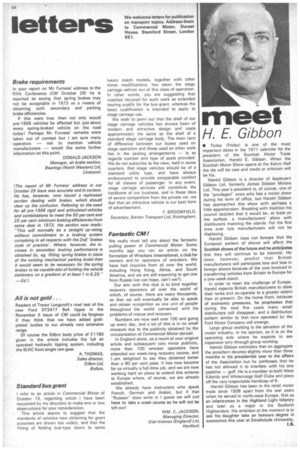Standard bus grant
Page 66

If you've noticed an error in this article please click here to report it so we can fix it.
I refer to an article in Commercial Motor of October 15, regarding which I have been requested by my directors to make one or two observations for your consideration.
This article seems to suggest that the standards of vehicles now obtaining for grant purposes are drawn too widely, and that the fitting of folding bus-type doors to some luxury coach models, together with other minor modifications, has taken the stage carriage vehicle out of this class of operation. In other words, you are suggesting that coaches recuired for such work as extended touring qualify for the bus grant, whereas the basic Qualification is intended to apply to stage carriage use.
We wish to point out that the shell of our stage carriage vehicles has always been of modern and attractive design and costs approximately the same as the shell of a standard stage carriage body. The main item of difference between our buses used on stage operation and those • used on other work lies in the seating arrangements -ie as regards number and type of seats provided. We do not subscribe to the view, held in some quarters, that stage vehicles should be of a standard utility type, and have always endeavoured to provide comparable comfort for all classes of passenger. In any event, stage carriage services still constitute the backbone of our business, and in these days of severe competition from the private car, we feel that an attractive vehicle is our best form of advertisement.
F. BROOM FIELD, Secretary, Barton Transport Ltd, Nottingham.










































































































































































































